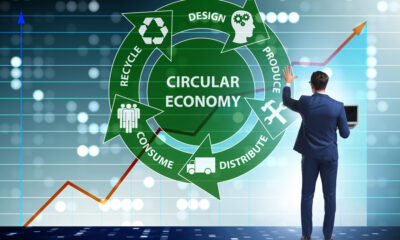

Features
The growing trend of eco fashion
It’s been over a year since Blue & Green Tomorrow first discussed the oxymoron that is sustainable fashion, but as we lead up to 2013, it’s clear to see that the concept has far from left the table, as Joanna Keeton describes.
Later this month, over 2,000 VIP guests, designers and visionaries alike, will make their way to the Canadian city of Vancouver in the name of fashion, education, and a green future, for the fifth annual Eco Fashion Week taking place from October 16-19.
A growing trend, even the esteemed New York Fashion Week has made good use of the buzzword, showcasing eco-friendly lines for Spring/Summer 2013, with the prominent appearance of biodegradable fabrics, natural fibres, and other ecological materials.
Brazilian designer Oskar Metsavaht included fish leather and vegetable dyed waste silk in his designs for Osklen, whilst Nina Skatta focussed on 100% biodegradable materials such as wool, bamboo, silk, soya, and organic cotton.
Twin Cities reported that Anupama Pasricha – a member of Educators for Socially Responsible Apparel Business (ESRAB) – felt that “by the looks of designers who showed recently at Fashion Week in New York […] the eco fashion movement is only getting stronger”.
Such is the prominence of sustainable, eco-friendly materials in the fashion world that a new third party, Sol Inspirations, has launched certification in eco-friendly clothing, jewellery, and other apparel. The certificate will show that designers have met stringent sustainability standards, and will allow the consumer to truly distinguish eco-friendly products from greenwashed brands.
Sol describes the industry with esteem, saying on its website that, “Responsible fashion contributes to a healthy, ethical and eco responsible world on many fronts including choosing organic and locally made textiles, manufacturing clothes efficiently to use less energy, respecting responsible labour practices, recycling clothes to make new fashion (up-cycling), and commissioning demi-couture clothing over disposable fashion.”
The Sol Inspirations certification is not only one of the most comprehensive labelling systems, but it is also free, meaning that no cost need be passed onto the consumer for the clarity the certificate provides. To become certified, designers must prove that at least 95% of the materials used are organic or recycled, and the labels will also be able to detail the products fair-trade qualities.
Clearer labelling is just another way in which the consumer can be made fully aware of their purchase decisions. It is, after all, ultimately their support and fashion choices that will drive the eco-fashion movement forwards, as summed up by Pasricha.
“If they do their part and make a conscious decision on what they purchase, they’re telling the retailers that this is important, and that’s where the whole change will come from.”
Though once rather a challenge to find eco-friendly fashion in the high-street, designers are starting to join the bandwagon with Topshop launching several fair trade and organic clothing lines recently, alongside other projects from the environmentally conscious Arcadia Group. Zara, River Island, Mango, and New look have also began to include organic cotton ranges within store making it easier than ever to shop eco-friendly.
However if a one-stop shop is more your game, then check out The Ethical Superstore, where everything from fashion and beauty, groceries and electricals can be purchased with a few clicks – hosting thousands of brands and designers with clear ethics.
Joanna Keeton is in the final year of an advertising and PR degree at the University of Lincoln. She has a keen interest in pursuing a career in journalism and events, and has a passion for travel and writing.
Further reading:
Sustainable fashion: an oxymoron?
Prisoners’ ethical fashion launches in the UK


 Energy11 months ago
Energy11 months agoThe Role of Renewable Energy in Commercial Real Estate

 Economy12 months ago
Economy12 months agoWhy Collaboration is Key for a Sustainable Circular Economy

 Environment7 months ago
Environment7 months agoAre Polymer Banknotes: an Eco-Friendly Trend or a Groundswell?

 Energy10 months ago
Energy10 months agoHow Energy Referral Programs are Saving The Planet… And Your Bank Account!



























